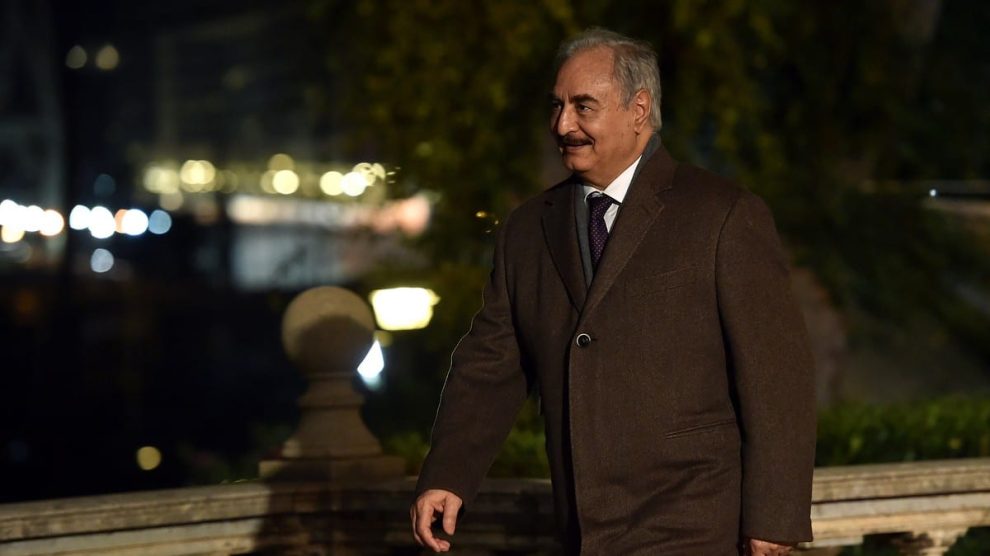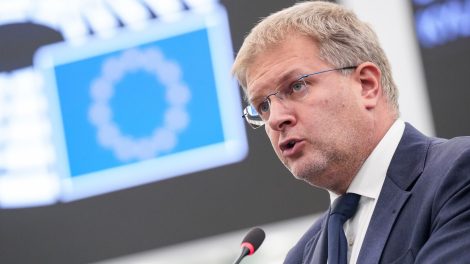The Meloni-Haftar meeting. On Wednesday and Thursday, Benghazi militia leader Khalifa Haftar was in Rome for meetings with government officials, including Prime Minister Giorgia Meloni and Foreign Minister Antonio Tajani. Talks revolved around migration fluxes, which are increasing across the Mediterranean, and political stabilisation in Libya and other African countries – including the Sudanese armed crisis.
- The Italian PM had travelled to Tripoli in late January, along with FM Tajani and Interior Minister Matteo Piantedosi, but hadn’t met with General Haftar in that initial liaison with Libyan authorities.
- However, the Italian executive sought to speak with the Cyrenaican general as the issue of immigration, a topic dear to the Meloni government for securitarian and electoral reasons, is in the spotlight.
By the numbers (and the power). Libya is the second-largest country of departure for migrants arriving in Italy by sea, with 16,637 arrivals as of May 2, 2023, up 166% from the same period in 2022. About 10,000 of them originated from the eastern Libyan region of Cyrenaica, where General Haftar – exerts his influence. His son, Saddam Haftar, has been orchestrating migrant smuggling through eastern Libya; so did groups linked to him in the area between Tobruk and Benghazi.
A risky interlocutor. General Haftar has been a key player in the conflict that has marked the last decade in Libya and contributed to creating the ongoing impasse that countered several attempts at stabilisation launched by the United Nations and the European Union. His militia has also received operational assistance from Russia’s Wagner Group – which Italian Defence Minister Guido Crosetto linked to a spike in migrant departures.
- Still, the Cyrenaican leader remains a crucial interlocutor in the negotiations about Libya’s future, and countries involved in the stabilisation process – such as Italy – have always maintained contact with him.
The expert’s take / 1. Giuseppe Dentice, director of CeSI’s Mena Desk, told Decode39 that the context of General Haftar’s meeting with the Italian government is risky, as it could further legitimise this controversial figure. Still, he noted, the meeting didn’t look like an attempt to head off the Libyan issue. “Rather, it appears to be a way to engage one of the parties and address one of the indirect issues of the conflict, as evidenced by the great focus on migration.” In other words, explained Mr Dentice, “we are not dealing with an international dossier, but we are looking to privilege one aspect of the issue within our national interest.”
The expert’s take / 2. “There is no doubt that we need to deal with [General Haftar], we have known that for a long time,” said Karim Mezran, Senior Fellow at the Atlantic Council’s Rafik Hariri Center for the Middle East. “But giving him all this attention hurts Italy’s profile. Rome has built a role for itself as a country that defends legitimate institutions and the process for pluralist institutionalisation in Libya.” As such, Rome might have given too much exposure to General Haftar, he noted.
The expert’s take / 3. The concern about the growth of migratory flows from Cyrenaica is understandable, remarked Arturo Varvelli, director of the Rome office of the European Council on Foreign Relations. However, he warned, “if one decides to welcome him as a political representative, what he will ask for in return will be something political.” In the long run, he noted, it could disrupt the UN mediation work and the political line held by Italy so far.
The French fallout. An international row soon ensued when French Interior Minister Gérald Darmanin said during an interview with RMC that PM Meloni is “incapable of solving [Italy’s] migration problems.” FM Tajani reacted by tweeting that he would not attend a planned meeting in Paris with his French counterpart, Catherine Colonna, calling Mr Darmanin’s words offensive and “unacceptable” and noting that “[t]his is not the spirit with which common European challenges should be faced.”
- FM Colonna then spoke with FM Tajani on the phone. She later tweeted that she told him “the relationship between Italy and France is based on mutual respect” and hoped that his visit would be quickly rescheduled.
- The spat is reminiscent of an earlier confrontation between the two governments over migrants relocation and underscores how politically sensitive the issue remains for both Paris and Rome.
- The Meloni executive is working to reconfigure the EU’s response to migratory fluxes and needs the cooperation of other countries to bring its intended reform over the line.





